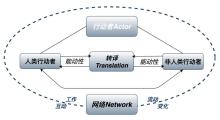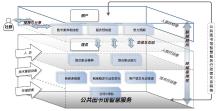| 1 |
周青. 以数字资源建设推动图书馆公共文化服务质量提升[N]. 中国文化报, 2025-01-21(7).
|
| 2 |
郭志清, 朱萌. 阅读不止于“书海”[N]. 中国文化报, 2025-04-25(2).
|
| 3 |
LATOUR B. Science in action: How to follow scientists and engineers through society[M]. Cambridge: Harvard University Press, 1988.
|
| 4 |
CALLON M, LATOUR B. Unscrewing the big Leviathan: how actors macro-structure reality and how sociologists help them to do so[J]. Advances in social theory and methodology: Toward an integration of micro-and macro-sociologies, 1981(1): 277-303.
|
| 5 |
戴宇辰. “旧相识”和“新重逢”: 行动者网络理论与媒介(化)研究的未来: 一个理论史视角[J]. 国际新闻界, 2019, 41(4): 68-88.
|
|
DAI Y C. The old acquaintances with a Reunion: Actor-network theory and the future of media(tization) study[J]. Chinese journal of journalism & communication, 2019, 41(4): 68-88.
|
| 6 |
王佃利, 付冷冷. 行动者网络理论视角下的公共政策过程分析[J]. 东岳论丛, 2021, 42(3): 146-156.
|
|
WANG D L, FU L L. Analysis of public policy process from the perspective of actor network theory[J]. Dongyue tribune, 2021, 42(3): 146-156.
|
| 7 |
CALLON M. The sociology of an actor-network: The case of the electric vehicle[M]// Mapping the Dynamics of Science and Technology: Sociology of Science in the Real World. London: Palgrave Macmillan UK, 1986: 19-34.
|
| 8 |
LAW J. Organizing modernity: Social ordering and social theory[M]. New Jersey: Wiley-Blackwell, 1994.
|
| 9 |
汤晓蒙, 武茜璇. 行动者网络理论视域下民间读书会运行的个案研究[J]. 广东开放大学学报, 2023, 32(3): 20-27.
|
|
TANG X M, WU Q X. A case study of the operation of a folk reading club from the perspective of actor-network theory[J]. Journal of Guangdong open university, 2023, 32(3): 20-27.
|
| 10 |
谭旭豪, 韩娜. 面向群体性事件治理的应急情报服务机制研究: 基于行动者网络理论[J]. 情报探索, 2022(4): 1-10.
|
|
TAN X H, HAN N. Research on emergency intelligence service mechanism for mass incident governance: Based on actor network theory[J]. Information research, 2022(4): 1-10.
|
| 11 |
秦小燕, 梁颖. 主题图书馆建设行动者网络模型构建: 以杭州主题图书馆为例[J]. 图书馆杂志, 2021, 40(11): 48-56.
|
|
QIN X Y, LIANG Y. The construction of actor-network model for theme library: A case study of Hangzhou theme library[J]. Library journal, 2021, 40(11): 48-56.
|
| 12 |
张小强, 汪红春. 智能出版行动者网络外用户非使用行为的价值及转译[J]. 科技与出版, 2021(3): 122-128.
|
|
ZHANG X Q, WANG H C. The value and translation of non-use behavior of users outside the network of intelligent publishing actors[J]. Science-technology & publication, 2021(3): 122-128.
|
| 13 |
钟欢, 马秀峰. 行动者网络理论视角下高校学科服务价值隐患与消解[J]. 图书馆工作与研究, 2020(8): 20-27.
|
|
ZHONG H, MA X F. Hidden dangers and elimination of subject service value in universities from the perspective of actor network theory[J]. Library work and study, 2020(8): 20-27.
|
| 14 |
司莉, 罗泉. 行动者网络理论视角下的公共图书馆社会教育跨界合作[J]. 图书馆论坛, 2020, 40(8): 70-77.
|
|
SI L, LUO Q. Cross-sector collaboration on social education in public libraries: A research based on the actor-network theory[J]. Library tribune, 2020, 40(8): 70-77.
|
| 15 |
何逸竹, 茆意宏. 用户体验视角下的智慧书房测评研究[J]. 图书馆论坛, 2024, 44(1): 36-43.
|
|
HE Y Z, MAO Y H. A study on evaluation of smart studies from the perspective of user experience[J]. Library tribune, 2024, 44(1): 36-43.
|
| 16 |
许天才, 任晓宇, 许诗曼, 等. 高校图书馆服务智慧化的用户体验预期与构建策略研究[J]. 大学图书馆学报, 2023, 41(1): 78-86.
|
|
XU T C, REN X Y, XU S M, et al. Research on user experience expectations and construction strategies of intelligent services in university library[J]. Journal of academic libraries, 2023, 41(1): 78-86.
|
| 17 |
程越欣, 张晓阳, 王正兴, 等. 高校图书馆自助服务需求识别与质量提升策略[J]. 图书馆论坛, 2022, 42(2): 139-149.
|
|
CHENG Y X, ZHANG X Y, WANG Z X, et al. Research on identification of self-service needs and quality improvement strategies for university libraries[J]. Library tribune, 2022, 42(2): 139-149.
|
| 18 |
刘宝瑞, 沈苏阳. 用户体验视阈下的智慧图书馆研究[J]. 图书馆学研究, 2017(6): 43-47.
|
|
LIU B R, SHEN S Y. Study on smart library from the perspective of user experience[J]. Research on library science, 2017(6): 43-47.
|
| 19 |
TELLA A. The determinants of library and information science undergraduate students' first impression of university library websites[J]. Education and information technologies, 2019, 24(1): 277-294.
|
| 20 |
IQBAL M, RAFIQ M. Determinants of overall user success in an academic digital library environment: Validation of the integrated digital library user success (IDLUS) model[J]. The electronic library, 2023, 41(4): 387-418.
|
| 21 |
SILVA B D O, CAMILLO E S, GUARALDO T S B. Competência cultural na gestão da diversidade: Estudo de caso em uma biblioteca[J]. Palabra clave (la plata), 2023(1): 1-75. SILVAB D O, CAMILLOE S, GUARALDOT S B.Cultural competence in diversity management: A case study in a public library[J]. Palabra clave (la plata), 2023(1): 1-75.
|
| 22 |
邵波, 王怡, 王进. 智慧图书馆建设进程与发展方向: 以南京大学为例[J]. 图书情报工作, 2023, 67(13): 14-20.
|
|
SHAO B, WANG Y, WANG J. Research on the construction process and development direction of smart library: Taking Nanjing University as an example[J]. Library and information service, 2023, 67(13): 14-20.
|
| 23 |
王星星, 侯建胜. 智慧图书馆建设: 基本原理、实践模式与机制构建[J]. 图书馆工作与研究, 2023(9): 12-18.
|
|
WANG X X, HOU J S. Smart library construction: Fundamentals, practice model and mechanism construction[J]. Library work and study, 2023(9): 12-18.
|
| 24 |
李沅洁, 邵波. 智慧图书馆十年实践研究: 进展、困境与出路[J]. 图书情报工作, 2023, 67(24): 135-148.
|
|
LI Y J, SHAO B. Research on the practice of smart library in the past ten years: Progress, dilemma and outlet[J]. Library and information service, 2023, 67(24): 135-148.
|
| 25 |
徐宗璐, 范俊, 尤锦烨. 装配设计工艺软件界面的设计与优化[J]. 兵工自动化, 2024, 43(10): 14-16.
|
|
XU Z L, FAN J, YOU J Y. Design and optimization of assembly design process software interface[J]. Ordnance industry automation, 2024, 43(10): 14-16.
|
| 26 |
张立. 基于用户的移动应用产品界面视觉设计研究[J]. 理论月刊, 2017(4): 67-72, 91.
|
|
ZHANG L. Research on user-based visual design of mobile application product interface[J]. Theory monthly, 2017(4): 67-72, 91.
|
| 27 |
胡永生, 刘畅. 全民数字素养教育: 实践进展、热点问题与发展趋势: 2023中国图书馆学会年会主题论坛分析[J]. 图书与情报, 2024(3): 13-19.
|
|
HU Y S, LIU C. Practice progress, hot issues and development trends of digital literacy education for all: A review of the theme forum of 2023 China library annual conference[J]. Library & information, 2024(3): 13-19.
|
| 28 |
李晓虹, 范昌鑫. 美国高校图书馆参与学习分析的研究与启示: IMLS《为学生成功连接图书馆与学习分析》报告解读[J]. 图书情报工作, 2023, 67(11): 138-148.
|
|
LI X H, FAN C X. Study and enlightenment of participating in learning analytics of American University library: Interpretation of connecting libraries and learning analytics for student success by IMLS[J]. Library and information service, 2023, 67(11): 138-148.
|
| 29 |
徐洁, 姜晓云. 用户关系管理视角下大学图书馆空间再造实践与思考: 以南京师范大学图书馆为例[J]. 大学图书馆学报, 2024, 42(6): 50-56.
|
|
XU J, JIANG X Y. Practice and reflection of academic library space reconstruction through the CRM perspective: A case study of Nanjing normal university library[J]. Journal of academic libraries, 2024, 42(6): 50-56.
|
| 30 |
刘会会. 智慧图书馆体系下的图书馆新型阅读空间建设与发展策略研究[J]. 图书馆界, 2024(2): 60-65.
|
|
LIU H H. Research on the construction and development strategy of new reading space in library under the smart library system[J]. Library world, 2024(2): 60-65.
|
| 31 |
王超, 佟昕瑀. 图书馆新机遇: 借数字素养教育赋能社会: 国际图联第88届世界图书馆与信息大会(2023)会前卫星会议信息素养分会亮点集锦[J]. 图书馆杂志, 2023, 42(10): 15-19.
|
|
WANG C, TONG X Y. Libraries empowering society through digital literacy education: The highlights of the IFLA WLIC 2023 preconference satellite meeting information literacy section[J]. Library journal, 2023, 42(10): 15-19.
|








